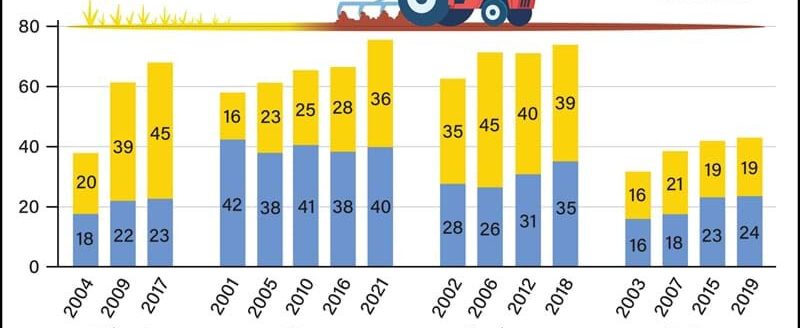Precision agriculture for the next generation of farmers
South Dakota State University to become first in nation to offer degrees in precision agriculture
Profitable and sustainable farming is more complicated than just seeds, soil and water. Continually improving yields to feed a growing population while maintaining thriving land for the next generation requires forward thinking and trying new things.
Fortunately, the next generation of U.S. farmers has new tools and
opportunities for ongoing success. One of these opportunities is an education in Precision Agriculture offered by South Dakota State University.
SDSU’s College of Agriculture, Food and Environmental Sciences is the first in the nation to offer a program of this kind. Through the Agronomy, Horticulture and Plant Science Department, students can earn a minor or a four-year Bachelor of Science degree in Precision Agriculture. So far, there are 71 students enrolled in the major and 64 students in the minor.
Precision agriculture tools
Precision agriculture includes new technologies like global positioning systems, sensors and monitors for irrigation, planting and fertilizing equipment, just to name a few. Farmers have a variety of technology options that improve their farming operation, from drones to weather monitoring systems and more. Farmers say that sometimes the hardest part is understanding what technology is available to you and choosing which is right for your operation.
Lewis Bainbridge and his sons Matt and Neal practice no-till as they grow corn, soybeans, wheat and alfalfa. As farmers in South Dakota, they know that precision ag is very important to their operation.
“We started using it to measure yields and moisture as soon as it was available. My sons use technology extensively. They design prescriptions for planting and fertilizing, and they also compile and utilize the data,” says Lewis, who is Chair of the United Soybean Board.
Lewis, Matt and Neal are graduates of South Dakota State University.
Precision technology is a broad category, and options are expanding as quickly as adopted rates. The bachelor’s degree in precision agriculture prepares a new generation of farmers to keep pace with these ever-evolving tools.
Precision ag use on the farm
Keith Alverson, a South Dakota corn and soybean farmer, sees tremendous potential benefit from the program.
“I am a South Dakota State University grad, and I received my agronomy degree there 16 years ago,” he says. “This degree is really interesting to me. I think our generation grew up as the video game generation, and so technology has always been interesting to us.”
He explains that on his farm, he and his father have always tried to keep up with emerging technologies, from variable rate planting and nutrient application to sprayer technology with individual row shut-offs and remote management irrigation. “We have always tried to use technology in a cost-effective manner that can give a positive return on investment to the farm,” Alverson says.
Most of the fields on Alverson’s farm are zone managed, and they take soil samples each year from each zone, based on yield history and performance. In the future, he is looking into multi-hybrid technology, where he could use different seed varieties or inputs in different performance zones of the land as needed. If one zone has more disease pressure, your planter can allow you to plant a different variety in that area only. “The ability to track and manage inputs from start to finish, and use that information to learn from it, allows me to pick up on small differences and make better decisions on the farm level,” he adds.
Expertise that helps farmers
Alverson says that he learns about these new technologies in a variety of ways, from Twitter and other social media to word of mouth from his friends and neighbors. But he admits that it is difficult to keep up, and it seems like almost daily there is a new company or technology that is available. The SDSU program can help create a workforce that is prepared to deal with that information.
“I have always liked to use technology and innovation to maximize capabilities on the farm. This will be a whole new group of students that graduate with the capabilities that are needed in the countryside—like folks who can work on this complex technology and troubleshoot to better help people in the rural community. The creativity that can get fostered feeds on itself,” Alverson says.
According to John Killefer, South Dakota Corn Utilization Council Endowed Dean of the South Dakota State University College of Agriculture, Food and Environmental Sciences, the degree program “prepares students for careers that bridge the gaps between agronomy, agriculture machinery management and data sciences caused by the rapid evolution of high-speed sensor technology.”
Specialists to fill the need
He adds, “It became apparent early on that producersin our region were very interested in precision agriculture and many were early adopters of precision farming technologies. Industry providers of farm equipment, seed, fertilizer and other inputs also had a fast-growing need for employees who could assist producers in utilizing precision technologies. At the same time, large volumes of mapping data were being accumulated, creating a need for expertise to utilize the data in decision-making. All these factors suggested a need for producing graduates with enhanced training in precision agriculture.”
Classes offered in the major include GPS-GIS technology, soil sciences, crop production, plant pathology, weed and pest management, precision data mapping, sensor technology, precision farm machinery andelectrical diagnostics.
“We already had outstanding degree programs in agronomy, ag systems technology, and ag and biosystems engineering. We soon realized that students need to have integrative training from each of those disciplines to best help the industry make good use of existing precision technology and to help develop future technology,” Dr. Killefer adds. “The precision ag major integrates those disciplines into a single educational program.”
To learn more about SDSU and the precision agriculture degree, click here.

